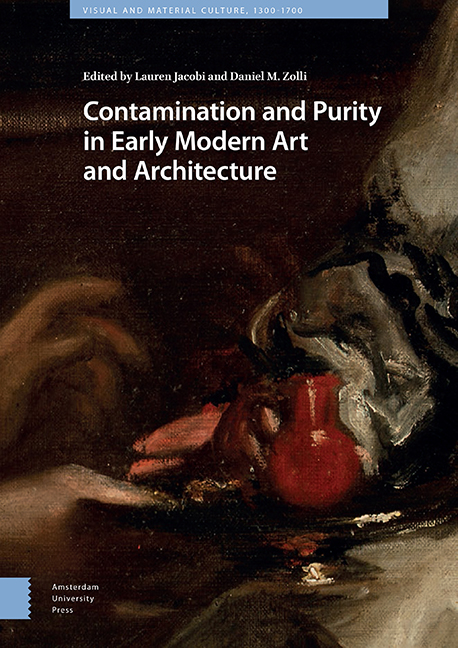Book contents
- Frontmatter
- Contents
- List of Illustrations
- Introduction: Contamination and Purity in Early Modern Art and Architecture
- 1 Generation and Ruination in the Display of Michelangelo’s Non-finito
- 2 The Sacrilege of Soot: Liturgical Decorum and the Black Madonna of Loreto
- 3 Sedimentary Aesthetics
- 4 ‘Adding to the Good Silver with Other Trickery’ : Purity and Contamination in Clement VII’s Emergency Currency
- 5 Tapestry as Tainted Medium: Charles V’s Conquest of Tunis
- 6 Bruegel’s Dirty Little Atoms
- 7 Leakage, Contagion, and Containment in Early Modern Venice
- 8 Contamination, Purification, Determinism: The Italian Pontine Marshes
- 9 Colonial Consecrations, Violent Reclamations, and Contested Spaces in the Spanish Americas
- 10 Contamination | Purification
- Index
8 - Contamination, Purification, Determinism: The Italian Pontine Marshes
Published online by Cambridge University Press: 27 May 2021
- Frontmatter
- Contents
- List of Illustrations
- Introduction: Contamination and Purity in Early Modern Art and Architecture
- 1 Generation and Ruination in the Display of Michelangelo’s Non-finito
- 2 The Sacrilege of Soot: Liturgical Decorum and the Black Madonna of Loreto
- 3 Sedimentary Aesthetics
- 4 ‘Adding to the Good Silver with Other Trickery’ : Purity and Contamination in Clement VII’s Emergency Currency
- 5 Tapestry as Tainted Medium: Charles V’s Conquest of Tunis
- 6 Bruegel’s Dirty Little Atoms
- 7 Leakage, Contagion, and Containment in Early Modern Venice
- 8 Contamination, Purification, Determinism: The Italian Pontine Marshes
- 9 Colonial Consecrations, Violent Reclamations, and Contested Spaces in the Spanish Americas
- 10 Contamination | Purification
- Index
Summary
Abstract
Situating Pope Sixtus V's large-scale project to reclaim marshy territory in Rome's hinterland as a precursor for the more well-known Fascist endeavor to ‘rehabilitate’ the Pontine Marshes, this chapter addresses the deterministic underpinning of both efforts. It makes the general claim that, when considering the impact of the Anthropocene, the environmental humanities gains from embracing the seemingly binary concepts of contamination and purification. Similar to the way in which Sixtus and his papal bureaucracy framed the massive effort to transform the Pontine wasteland into a metaphor for Counter-Reformation moral reform, Mussolini presented the ‘War for Wheat’ and Fascist territorialization operation as ethnic purification rooted in a project to de-soil land.
Keywords: environmental humanities, Pontine Marshes, Agro Pontine, Sixtus V, fascism, swamps
As a discipline, architectural history promises an assortment of tools to understand how interventions in the constructed environment reflect cultural desires to collectively shape the earth's meshwork and how physical environments have their own agency in such processes. Scholars continue to probe topics including architecture's role in environmental consumption and manufacturing – the undercurrent byproducts of systematic capitalism and industrialization. Fraught issues of toxicity and purging, aspects of which haunt the built environment, should continue to be tackled. Yet, broadly speaking, as architectural history engages and intersects with the environmental humanities, new means of evaluation are needed for buildings, urban environs, landscapes and territories. And indeed, fresh methods and epistemologies have started to emerge to innovate the way scholars narrate and write about the convergence of architecture and the history of the environment, for instance through what has been termed ‘environmental counter-histories.’ Landmark studies include Donna Haraway's publications that have demonstrated how gender has structured discourse about the natural, particularly within primatology. Erasing the boundary between subject and object, Haraway ascribes to a view of hybridity. Additionally, William Cronon has revealed, in his pathbreaking studies on Chicago, how society constructs landscapes.
This essay offers preliminary thoughts about the trajectory of charged, socioenvironmental interventions, focusing specifically on sixteenth-century Lazio, a region of Italy that looked to Rome as its political, cultural and geographic epicenter. To date, little attention has been given to how environmental thinking was a component of territorial and infrastructural interventions in pre-Enlightenment Europe.
- Type
- Chapter
- Information
- Contamination and Purity in Early Modern Art and Architecture , pp. 267 - 282Publisher: Amsterdam University PressPrint publication year: 2021

